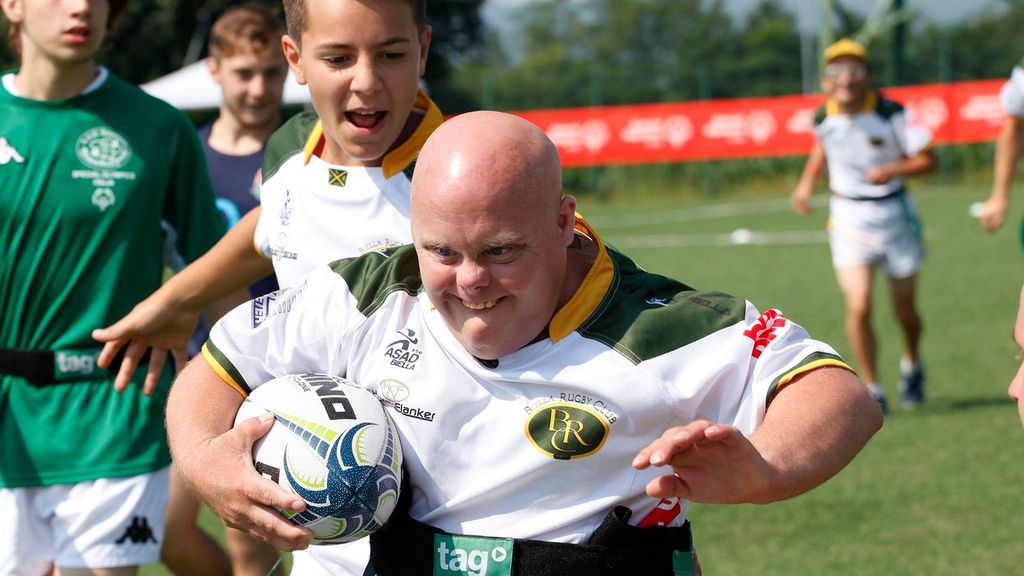Special Olympics (SO) supports over three million athletes with intellectual disabilities, one million coaches and volunteers and runs over 100,000 competitions annually.
While rugby is not officially one of 36 sports played under the Special Olympics banner, Special Olympics are aiming to develop it as an official sport and the sport is no stronger than in Italy, where a flagship partnership with Federazione Italiana Rugby (FIR) has enabled athletes to flourish.
“One of the sports we are focusing on at the moment is rugby, flag-tag rugby. We’re not looking at contact rugby at the moment,” said Colin Kenny, Senior Sports Partnerships Manager for Special Olympics Europe/Eurasia.
“There have been pockets of activity over the last while, and in Italy in particular there has been a very strong development of the sport, mainly through a fantastic partnership they have with the Italian Rugby Federation.”
Formal agreement
That partnership began informally in 2013 with members of the national Italy men’s team attending a training clinic with SO Italy athletes.
Since then the relationship has gone from strength to strength with more training and coaching input from FIR-affiliated referees and coaches as well as promotional activities such as the “Wear the Laces” fundraising campaign.
In 2017, a formal agreement was signed in Florence between SO Italy and FIR and this is seen as a template for other countries to follow moving forward.
Nearly 50 athletes with intellectual disabilities currently play the sport in Italy and there are plans to double the number of clubs to eight in due course.
The majority of those involved in SO Italy rugby are also involved in the Unified Sports project, which sees players with and without intellectual disabilities play on the same team.
United by rugby
Kenny says that Unified Sports is an essential piece of the jigsaw as it brings the whole of the rugby community together.
“One of the many good things about rugby anywhere in the world is its community emphasis,” he said.
“SO Italy are working hard on that, getting SO athletes as part of the grassroots and professional clubs.
“Inclusivity is a positive for everyone concerned.
“For the athletes, there are more training and playing opportunities and playing on the same team as those without disabilities helps to breakdown stereotypes.
“And for the clubs, it widens their reach into the community.”
Strengthening the player pool
At one stage, the Special Olympics athlete pool amounted to six million people, but post-COVID that number has roughly been halved as many athletes were not able to participate in Special Olympics activities during the pandemic due to government restrictions across the world.
There are further challenges now as coaches and volunteers may not return, which will further reduce the capacity of Special Olympics National Programmes to run activities. And the situation has been exacerbated by cuts in services for people with disabilities generally during COVID-19 which has led to a myriad of further issues.
Rugby is seen as one of the sports that can help reverse the trend and boost participation figures worldwide, not just in Italy.
“Hopefully we’ll get a lot of the athletes we’ve lost back, post-COVID, but there are no guarantees, so we have a lot of work to do,” said Mr. Kenny.
“That’s why rugby is so attractive as a sport to us because it has a low cost base, it integrates well into a community, there is an existing structure already with the clubs and it is quite an easy sport to coach. Non-contact rugby is pass and run, which is great for the people we work with, whereas there’s quite a technical element to sports like tennis and golf.”
Big stage awaits
A further sign of rugby’s growing standing in the SO movement are plans to include the sport in the Special Olympic World Games should the participation levels grow to the required level.
Alternating between summer and winter, the World Games have become the movement’s flagship event since the first tournament was staged in 1968.
While the Berlin 2023 Special Olympic World Games will come too soon for rugby’s inclusion, it is hoped that all the necessary structures will be in place for the sport to make its presence felt at the next summer event in 2027.
“We are looking towards a pathway where maybe rugby can be included in some shape or form as a demonstration sport,” confirmed Mr. Kenny
In the meantime, Italy will continue to fly the flag for rugby in the Special Olympics space.
“We are proud of our partnership with SO that was created with the goal of increasing opportunities to play and grow rugby,” said Daniela De Angelis, head of Corporate Social Responsibility (CSR) at FIR.
“We encourage the participation of our Integrated Rugby athletes, now present in many clubs of the Federation, in the Special Olympics activities, as well as SO athletes in our federal activities.
“We have always looked up to the world of SO for its ability to offer thousands of athletes, families and communities a daily opportunity for sport, but also extraordinary moments of competition, commitment and celebration with the World Games.
“Our journey, therefore, continues together and we are happy to work side by side with SO with the hope of seeing Rugby in the World Games soon”






